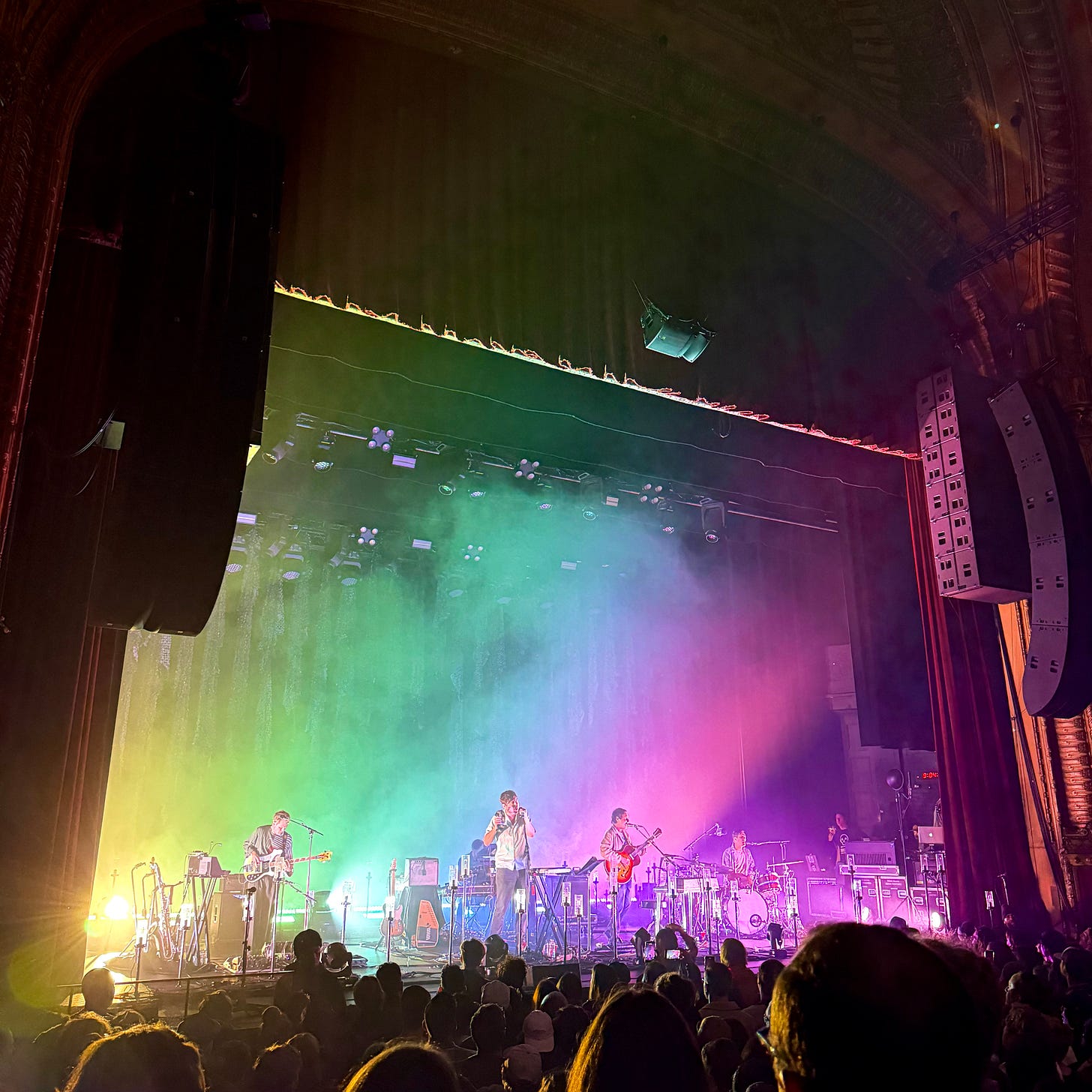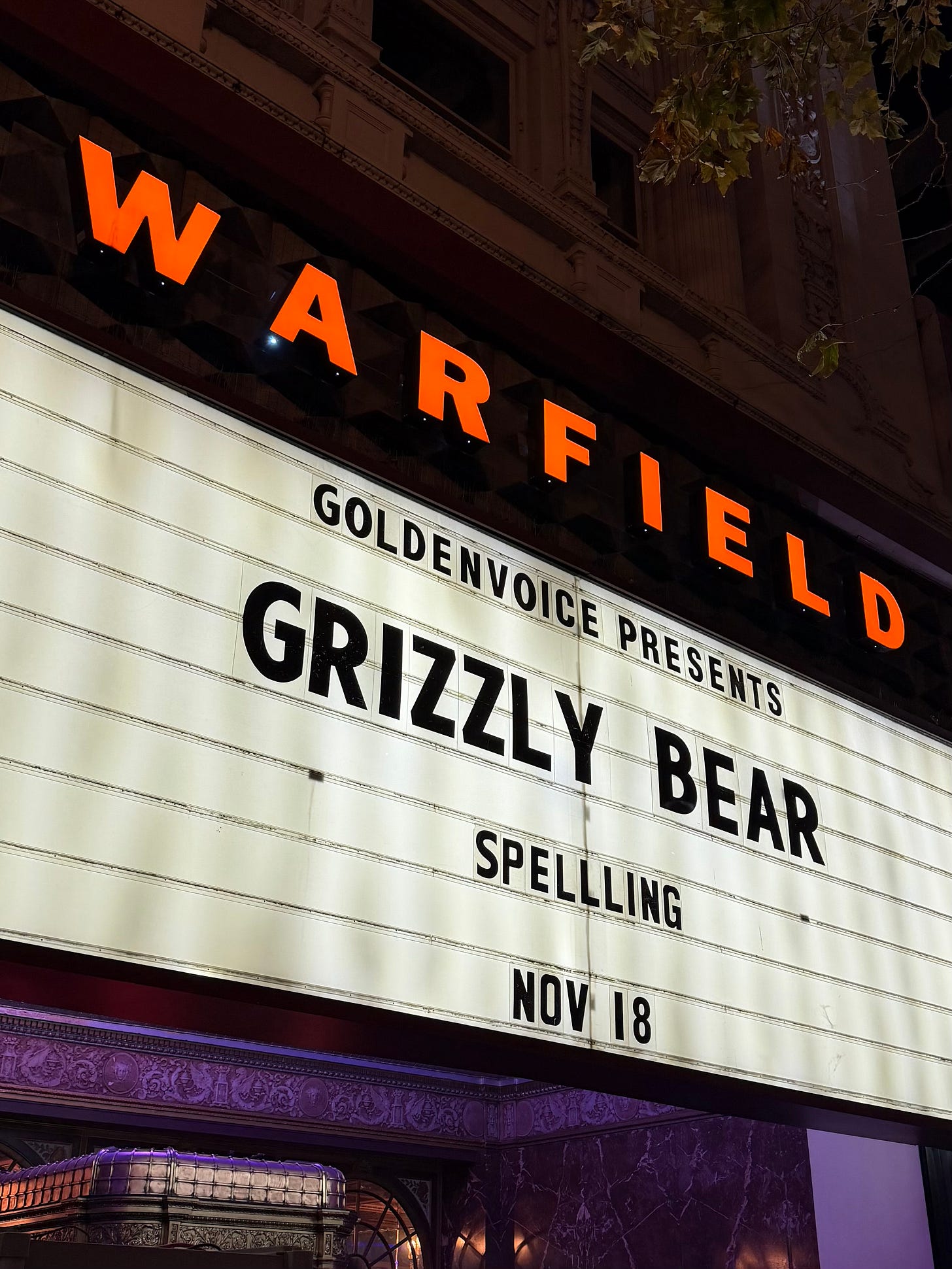Do It Again
Grizzly Bear in concert
I have, not entirely accidentally, become a professional music critic.
The active part of this job consists primarily of talking or writing about music. These are things I enjoy doing, and they take up a few hours of my time each week. In order to do them, however, I need to devote much more time to passive tasks, one in particular: listening. I listen to so much goddamn music.
Surely, I could get away with listening to less, but in general, I like doing it, even when the music is bad. An inexhaustive list of what I’ve been spending time spinning recently: Slightly American Music, the bootleg compilation of Brian Wilson’s unreleased collaborations with Andy Paley from the mid-90s; a tape of Bob Dylan’s positively exquisite performance at the Hammersmith Apollo on November 24th, 2003; Stars & Stripes Vol. 1, the depressingly half-assed collection of Beach Boys country covers from 1996; Traveling Wilburys Vol. 3, the charmingly half-assed swan song from Boo, Spike, Clayton, and Muddy Wilbury. Subjects, one and all, of recent or upcoming podcasts in the Jokermen universe. Call it “business listening.”
I do still have time for pleasure listening, but less than I used to. I need to be discerning about what I spend it on. I’m not always looking for a return on my investment, but it’s nice when I can get one. The fact that I’m even thinking along these lines—of time as a finite resource, of records as equities to be bought and sold on an exchange—proves my point. Would I prefer not to view my entire life through a marketized lens? Absolutely. But in this reality, it’s hard not to. Such is life (mine, anyways).
All of which is to say, I don’t get to listen to all the music I want to as much I want to. Typically, this doesn’t pose too big a problem. This week, however, it did. This week I saw Grizzly Bear.
Like many other Grizzly Bear fans, I was the just right age (17) at just the right time (2009) for them to become one of the bands for me. Along with Merriweather Post Pavilion and Bitte Orca, Veckatimest formed a holy trinity of releases from that year—three unimpeachable classics working in distinct, but complementary, palettes. Merriweather was the delicious one, full of candy-colored synthesizers and massive hooks that were just weird enough to put certain people off. Bitte Orca was the rangy one, a consciously high-art collection of cubist songs that were more than happy to be misunderstood. Veckatimest was the warm one: ruddy and a little bit mannered, close enough to the Fleet Foxes/Bon Iver folk revival scene to hook sad little lads like myself, but still a full-throated rock record at its core.
And it wasn’t just Veckatimest. It was Yellow House, a deliberate, clattery record closer in spirit to the rustic strangeness of Sung Tongs or Feels; it was In Ear Park, the lovely, unassuming release from Daniel Rossen’s side project Department of Eagles; it was the cover of “He Hit Me,” an ironic genderfucked reinterpretation of a sickening, undeniably beautiful Crystals classic. Then, several years later, it was Shields, a knockout followup to Veckatimest that arrived at precisely the wrong moment, as the indie rock vanguard of the previous decade scattered to the wind, undone by a toxic combination of algorithms, poptimism, and a declining rate of profit in the touring industry.
I saw Grizzly Bear for the last time on the Shields tour, on a warm, cloudless night at the Greek Theater in Los Angeles. It was a powerhouse show: ornate, muscular, perfectly suited for the dark hills and dusky spirits of Griffith Park. The band, it seemed, was well on their way to festival headliner status—the next Arcade Fire, say, or LCD Soundsystem, an undeniable force able to walk the narrow line between artistic legitimacy and commercial success.
This, as it turns out, didn’t prove quite right. Grizzly Bear was not the next Arcade Fire or LCD Soundsystem—they would not, thank god, go on to embarrass themselves with faux profundity, crypto festival appearances, or the innumerable personal and professional missteps that Win Butler has devoted the past fifteen years of his life to making. Instead, they would just kinda chill. After the subdued release of Painted Ruins in 2017, Grizzly Bear drifted into an unofficial hiatus. Ed Droste began pursuing a therapy license, Rossen and drummer Chris Bear continued collaborating on side projects and film scores, and Chris Taylor continued to look supremely stylish (he also, presumably, did other things with his time). In this way, they became Schrödinger’s band, simultaneously alive and dead as long as no one said otherwise.
Now, for reasons unknown, they are back together and doing it again, on a tour that isn’t being billed as a reunion but nevertheless feel like one. I am back, too. I owe them that much.
When I bought a ticket for the show half a year ago, I planned to start studying up well in advance. I was pretty sure the records held up, but I hadn’t listened to them consistently in years, and I wasn’t at all certain how much would still be familiar to me. Unfortunately, life got in the way—business listening, remember?—so a single spin of Yellow House and Shields the day before the show was the most I could manage.
Turns out, I didn’t need anything more. Everything slid right back into place, long-forgotten melodies and rhythms blooming out of fallow patches of my brain. It all sounds great as ever; credit to my younger self for having such good taste. Shields in particular is a (re)revelation: ornate, rangy, nimble, heavy. If this record dropped today, critics would be falling over themselves to dub Grizzly Bear one of the most exciting rock acts of 2025.
Maybe they are anyways, judging by last night’s show. This is still immaculate music, as strange and robust and compelling as it ever was. It sounds even better live. From the first instant of the show, one thing is clear above all else: Grizzly Bear fucking rocks. Songs like “Sleeping Ute,” “Ready, Able,” and “While You Wait For The Others” kick as much ass as anything released this year. Rossen’s guitar is cranked to teeth-chattering levels, almost to the point of drowning out more delicate elements of the music. Lest this sound like a complaint, let me be clear: it isn’t. There is no such thing as a too-loud guitar.
The setlist was methodical, a well-paced tour through some (but not too many) of the greatest hits. There was lots of Veckatimest, but plenty of Yellow House and Shields too—shout out to main-set closer “Sun In My Eyes,” which sounded positively massive, Droste and Rossen’s water & oil vocals exploding out of the PA, consuming the entire theater. Many of the songs relied on the “Grizzly Bear formula,” for lack of a better term: precise, austere intro, steady build, and cathartic crescendo, a mess of chords and keys and various other components—a Horn of Plenty, if you will. The crowd ate it up, thrilled to see a touchstone of the Obama era back in such fine form. If you closed your eyes, you could almost imagine it was 2009 again, and you, Jay-Z, and Beyoncé were all bopping along to “Ready, Able” in Williamsburg…
As powerful as Grizzly Bear still is, it’s clear they have their roots in another era. There is a certain seriousness to the music that marks it as an artifact from an age when we weren’t all eternally online—when the computer was something that lived in its own room in the house, and a phone was something you made calls on. This isn’t to say the show is dour. Vibes last night were uniformly posi, Droste and Rossen both at ease and gently self-effacing, but there was a noticeable lack of irony and absurdity to the proceedings. You’re never gonna get a “houseboat docked at the Himbodome” out of these guys.
Not that you’d even want to. Still, I can’t help but wonder where this leaves Grizzly Bear, and what their future might look like. Clearly, these guys can still do it; despite some of Droste’s ambivalent comments about the nature of paying the bills by working in a rock band, I bet they even want to—at least some of the time. Whether the culture will allow them to is another matter. There’s little money in record-making these days, especially for acts that don’t cater specifically to the algorithm. Musicians have to make ends meet just like the rest of us—then they need to actually make music.
At one point, a band of Grizzly Bear’s caliber could do the former by doing the latter. These days, it isn’t quite so simple. As challenging as tour economics can be, reunion shows are one of the last remaining reliable income streams in the rock industry. It may not be everything we want from a given band, but it’s more than nothing. I’m happy to do my part and buy a ticket.
There’s nothing wrong with getting back together and doing it again—especially when it’s done this well.





